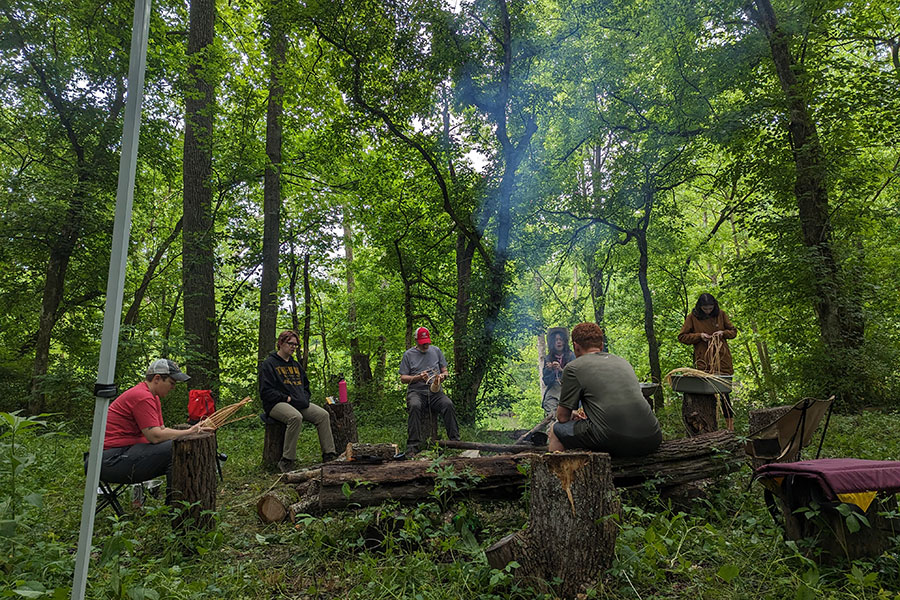
Adam Hamze heard a few no’s and “got a few weird looks,” he said, when randomly asking Appalachian residents to sit and talk to him about how media commonly speak with negative stereotypes about the region’s residents.
Hamze, a rising junior political science major at Radford University, is working on a documentary on the topic. His film will also highlight people’s stories and the beauty of the region.
The Stafford, Virginia, native conducted his interviews while participating in the university’s RARE Appalachia program, a two-week trip exploring remote areas tucked away in Southwest Virginia’s Appalachian Highlands.
Now in its second year, RARE Appalachia is a student-centered, research-focused excursion in which undergraduate and graduate students conduct their own original research that is related to their majors. Much of the research focuses on the region’s ecology, geology and cultural heritage.
Throughout the trip, Hamze approached people, told them he was a Radford University student and asked if they would they would sit and talk with him. He was shunned a few times but ended the RARE journey with six interviews – more than he expected – with a diverse group of individuals. He’s currently in the editing process and hopes to screen his film in the fall.
The experience of creating the documentary while participating in RARE helped Hamze “grow as an individual,” he said. “Being in the Appalachian Mountains and meeting all these new people has given me more of an open mind and a willingness to take on new experiences.”
Each student participant worked on their own unique projects. Veronica Vann sought to explore how faith leaders – priests and pastors – can affect their congregation’s physical and emotional health.
“We know that more religious people tend to be healthier and have better health outcomes,” said Vann, a nursing student from Richmond, Virginia. “This has been proven over and over again. However, there isn't much research on the causes of this phenomenon. I wanted to explore just one angle: how faith leaders directly affect health.”
Vann pre-scheduled a couple of interviews, but like Hamze, she met most along the RARE expedition. She made many connections with leaders just by attending church services. One pastor she met organized a food bank that feeds more than 400 families a month. He also conducts a prison ministry and “runs a halfway house to help get people back on their feet,” Vann said.
“By walking into a church with doors open, I was able to meet the pastor and conduct an interview,” Vann explained. By chance, she also met U.S. Sen. Tim Kaine, who was speaking that day at the church.
Along the RARE Appalachia trip, Salome Cook snapped a lot of pictures and scribbled many notes of birds she saw. She’ll use those as references to portray bird behaviors in a series of watercolor illustrations she is planning.
“The super exciting and cool thing about scientific illustration is that you can observe the behavior that you encounter, take lots of notes and then if you can't capture exactly that behavior on camera – because birds are skittish and hard to photograph – you can still get good reference images and paint what you saw, even if you didn't't get it on camera,” explained the rising junior studio art major and avid birder.
Cook is working with her research mentor, Assistant Professor of Biology Sarah Foltz, to further analyze the behaviors she observed on the trip.
Her ultimate goal for the project “is to keep going!” she said. “There is a huge gap in bird knowledge that I believe can be filled through illustration. I gathered a few usable points of data on the trip that will turn into final illustrations, but I know there is so much more that could be captured the way I am trying to capture it.”
RARE Appalachia isn't only about projects. Participating students do so much more. Led by two faculty mentors, Professor of Sociology Aysha Bodenhamer – the university’s sustainability manager – and Professor of Religious Studies Paul Thomas, students kayaked scenic rivers and hiked through deep forests. They took a behind-the-scenes peek at the historic Barter Theatre in Abingdon, Virginia, explored a cave in Dungannon, Virginia, and dined with cowboys and learned from rangers, scientists, scholars and locals who are reshaping how people live, work and think about the area.
“Students agreed that the potential for immersion in the Appalachian landscape was best realized at Stuart Land and Cattle,” Thomas said, “where they got to explore the Little River, bog pond and old cedar forests.”
RARE Appalachia was “one of the most special things that I have gotten to be a part of in my college career thus far,” Cook said. “There were some things that happened out there that are completely indescribable. You get really close to this huge group of people really fast, and you're uncomfortable 90% of the time, and you're also having the most fun you've ever had while you're learning as much as you possibly can. It's just special. It was sad and beautiful and hard and important and perfect.”